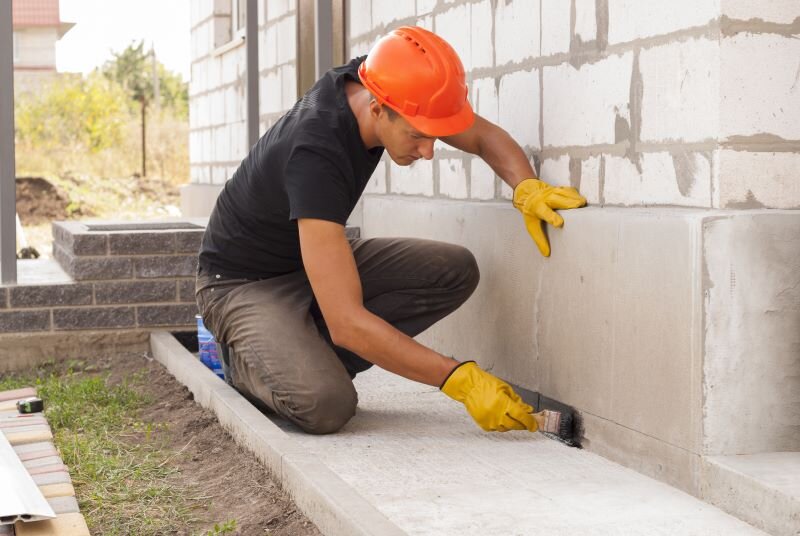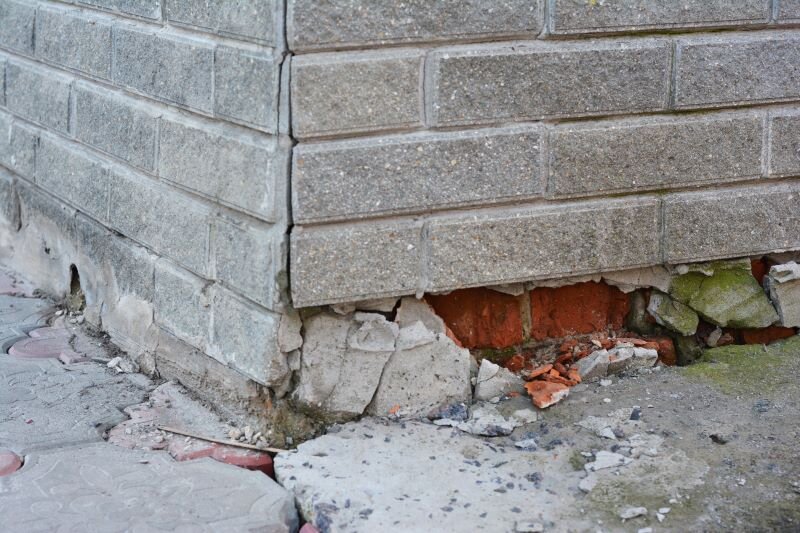
Your home is probably your most valuable investment. It provides shelter, a place to store your possessions, and keeps your family safe. It can also have tremendous monetary value if you sell your house.
Unfortunately, one issue that can significantly reduce the value of your home is a cracked foundation, and homeowners look for them constantly.
Cracked foundations can come in various shapes and sizes, ranging from minor surface cracks to severe problems like bowing or buckling walls.
No matter what foundation problem you have in your home. It’s vital to repair any issues immediately.
While there are professionals who specialize in fixing structural problems, you can also take on the task yourself.
If you are getting ready to sell your house and worried about cracked foundation repairs, keep reading. This article will cover everything you need to know about the different types of cracked foundations and how to repair them. By the end of the article, you can get your home back in tip-top shape.
Cracked Foundation Repairs
The average home weighs 200-300 pounds per square foot, not including the foundation. The foundation supports the entire weight of your home, so it’s not surprising that your foundation block may show signs of wear and tear over time.
If you spot some cracks in your foundation, don’t panic. In most cases, the problem is minor and correctable. However, there are some cases where a cracked foundation can signify more severe problems.
There are various reasons why your house’s foundation may be cracking. Some of the most common include:
Construction Procedures: When your home was built, improper construction may have caused some weak points in the foundation, leading to cracks. Some common problems are not adequately compacting the soil before pouring the foundation, using undersized foundation footings, or poorly mixed concrete.
These types of errors typically result in minor cracks during the curing process of the foundation. These cracks are not dangerous.
Settling Foundation: The foundation of your house may be settling over time, resulting in cracks. A settling foundation can happen even if the builders use all the proper construction techniques. The ground under your home will naturally shift over time. Water erosion and soil creep can move the soil under your home if you live on a hill.
Cracks due to foundation settlement can become serious problems depending on the root cause. You should immediately consult an expert on foundation settlement if you notice this problem.
Weather changes: Extreme weather conditions such as drought or heavy rains can cause your foundation to expand or contract, which can cause cracks. This foundation damage is less common and only occurs in places that experience massive temperature shifts.
This type of damage is not typically serious. You can prevent this by using gutters and having the appropriate landscaping.
Groundwater Pressure: Groundwater pressure occurs when water builds up around your home’s foundation, making it unstable and causing cracks. Groundwater pressure can change if your area is undergoing periods of flooding or droughts. Carbon fiber waterproofing is an excellent way to prevent this problem.
This type of damage is the most problematic foundation damage, and you should address it immediately.
Need To Sell Your House Fast?
We make it simple to sell your house in as-is condition – even with cracked foundations.
Just fill out the form below or give us a call at: (414) 488-0082 to get your free, no-obligation cash offer!
Types of Cracked Foundations
Now that you know the different causes of foundation cracks, it’s time to understand the different types of foundation cracks in a concrete foundation.
Horizontal Cracks:
Horizontal cracks are one of the most dangerous types of foundation cracks. You should immediately look into cracked foundation repairs if you notice horizontal cracks. They typically appear along the top of basement walls or on a cinder block foundation, forming a jagged line.
Extreme temperature changes, poor drainage, drought, and shifting soil can all cause this problem. These cracks can be problematic if they are over a quarter of an inch wide and run from side to side.
Stair Step Cracks
These cracks form an uneven pattern, similar to stairs, usually caused by a settling foundation. You commonly see these cracks in the mortar between different foundation blocks. You typically find them on a foundation wall.
This type of crack is not typically serious. However, if the cracks continue to widen, start to leak water, or extend through the entire block, you should seek immediate repairs.
Hairline Cracks
Hairline cracks are the narrowest type of foundation crack and usually occur in poured concrete walls. They are considered the most common type of crack and are nothing to worry about if they are less than a quarter of an inch wide. Groundwater pressure changes and soil expansion and contraction typically cause these cracks to form.
However, if the cracks become wider than a coin, leak water, or become numerous, you should seek professional help.
Vertical Cracks
Settlement is the most common cause of vertical cracks on your walls’ sides. Settlement is when the soil beneath your home shifts, causing the foundation to sink.
Vertical cracks can range from an eighth of an inch to more than an inch wide. The crack size can indicate the damage’s severity, with more minor cracks being less serious than larger ones.
Sometimes you can repair a vertical crack without any professional help. If the crack is small and not causing major structural damage, you can try to fix it yourself using epoxy.
Diagonal Cracks
Diagonal cracks usually form when one side of the foundation moves at a different rate than the other, making it shift and form an angle. Diagonal cracks typically occur when the soil is uneven beneath your home or when one side is sinking or shifting away from the other.
Diagonal cracks can become serious if they are a quarter of an inch or wider. If the crack is more extensive and has other signs of foundation damage, you should contact a professional to inspect your home’s foundation.
Shrinkage Cracks
Shrinkage cracks typically form in the corners of a wall or the areas where two walls meet. They are caused by a lack of moisture in the concrete when it dries out too quickly and contracts.
These cracks are usually not serious, but you should still monitor them. If the cracks widen or water begins to leak through them, you should contact a professional to inspect your home’s foundation.
Foundation Slab Cracks
Foundation slab cracks usually form in the foundation itself and are caused by the same issues that cause other foundation cracks. These can be serious if they are wide and have started to cause water damage. If you notice this type of crack, contact a professional right away.
Non-Structural Crack
You typically find non-structural cracks in drywall or walls. You might also find them in your crawl space. You can repair them without a professional’s help, but if the cracks become larger or you notice other signs of foundation damage, contact an experienced repair specialist.
Can You Repair Foundation Cracks By Yourself?
It depends on the type of crack and the severity of the damage. You can repair minor cracks less than 1/4 inch wide with a concrete sealant or caulk.
However, repairing a crack does not necessarily solve the root problem causing the crack. Depending on what is causing your foundation cracks, any cracked foundation repairs that you do will have to repeat until you solve the source of the problem.
Contact a professional foundation repair specialist if the crack is more severe and indicates potential structural damage.
How to Repair Foundation Cracks By Yourself
If the crack is small and not causing any major structural damage, you can try to repair it yourself.
First, clean the crack with a wire brush and water to remove dirt or debris. Next, use a caulk gun to inject concrete sealant into the crack. Allow the sealant to dry completely before inspecting it again.
You can also use a concrete patching compound if the crack is larger than 1/4 inch wide. Fill the crack with the patching compound, then smooth it out with a putty knife.
Can You Sell a House With a Foundation Crack
No matter if you want to sell a house fast in Wisconsin or any other place, selling a home with a foundation issue is difficult. Selling a home with a foundation crack is possible, but finding a buyer willing to take on the potential costs of foundation repairs may be difficult. Fixing your foundation cracks is critical in getting your house ready to sell.
Foundation cracks can indicate more serious structural damage, so you should contact a professional to inspect your home before deciding whether to sell a house as is or fix it up.
If you are already selling your home, consider getting a home inspection to identify potential problems before prospective buyers arrive. Getting a home inspection will give potential buyers the confidence to purchase your home.
Cracked foundation repair can be costly, but it is essential to remember that the safety of your home is at stake. Taking proactive measures to identify and repair cracks can help protect your home and give prospective buyers the confidence they need to make an offer.

The Solution to Cracked Foundations
Cracked foundations are a common issue for home and property owners. You should proactively identify cracks in your home’s foundation and contact a repair specialist for any cracks requiring professional attention.
You can fix most foundation cracks yourself with the correct information and guidance. But if you are unsure of the severity of the crack and are worried about the structural integrity, you should immediately contact a cracked foundation repairs expert.
Remember, safety should always be your top priority for foundation repairs. Contact a professional repair specialist today for the best advice and solutions for your cracked foundation repair needs.
If you don’t want to go through all the hassle of fixing up your house, we buy houses Fox Point, or you can find cash home buyers in Milwaukee.
